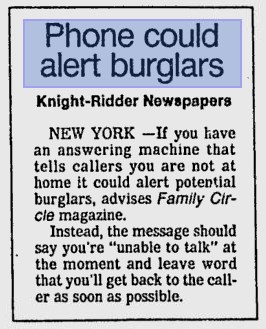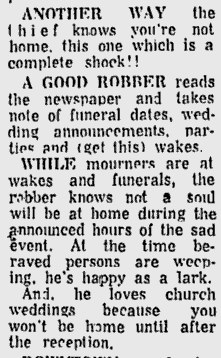The more things change…
“… Anyone who wants to can see a list of all the events you are planning on attending? It’s like a stalker’s delight.”
— Comment about Upcoming.org from September 23, 2003, six days after launch
“It’s bad enough we’re using real names and telling people where we’ve been. Now it’s like prepping someone for the best times to try robbing your apartment.”
— Comment from June 2005
Further back, from the Montreal Gazette, September 1983…

From 1977, don’t list your weddings or funerals in the paper, unless you want to get robbed…


The problem, as I see it, is that if I’m stalking someone, I can’t be robbing their house.
It’s 2010! I’m a busy man! The first service that lets me stalk people _and_ steal their stuff will get my business.
And by “business,” I mean, “A piece of my ear.”
Yeah, PRM seems to be attempting to capitalize on the hype around Foursquare by encouraging encouraging people to be more conscientious about privacy, and sharing, but its falls flat in light of how real crime and robbery works. Any robber stupid enough to trust 4sq over their own eyes and sleuthing skills are probably going to get caught pretty quickly. The fact that someone checked in somewhere else and that information is available on Twitter is probably of minor importance relative to things like neighborhood awareness, area crime rate, etc.
And most of us spend 9-10 hours out of our house every day, on a relatively predictable schedule.
Correlating people’s tendency to share information about themselves and their locations with a general trend of “more bad things happening in the world because of technology” reminds me of the timeless anxiety that with progress comes the inevitable perversion of proper society. People adapt and recalibrate their choices and ethics based on the influences and circumstances of their life, and its a little patronizing to moralize about how things “could have been.”
I remember back when telephone answering machines were considered Dangerous, because them answering would be taken as evidence the house was empty. It doesn’t even make sense now, but Google is still full of advice saying “don’t record an answering machine message that says ‘I am not home'”.
Nelson: Very funny, I posted a 1983 article that says the same thing. But I also found articles from the same era that say that you should buy an answering machine, because if you don’t pick up, it’ll warn burglars you’re not home.
Great post!
You know, if you aren’t constantly updating the Web with your status, it can only mean that you are traveling so far away from home that you can’t get (or afford) a good Internet connection.
Thieves will notice this and rob your home in your absence.
So, it’s best to setup a bot to constantly update your status with messages like “installing a new alarm system with lazzors FTW!” and “training my attack dog to not bark until *after* he bites” and “wow, it’s awesome fun having SWAT staked-out in my home this week” 🙂
so just to be clear, i should advise my friends and family to take out a massive amount of homeowners insurance before they start using the newer internet services?
The obvious solution is to not have a home. 🙂
There are any number of ways for robbers to target people who aren’t home. I know of cases where robbers broke into the home of people who had been arrested and were in jail.
And before that, robbers could overhear when someone said they would leave the house.
The problem is one of scope and automatisation. If you look at the timeline of these reports, it got easier and easier every time. And _that_ is the point.
I suppose, if you think about these messages as sales leads, then I would tend to agree with Richard Hartmann. A good salesman (burglar) can get a lot more leads with a lot less effort today. It’s worth considering – I do – but not really worth worrying about. As others have pointed out, just going to work regularly makes for a huge window of opportunity. Don’t worry; be happy 🙂
The idea that burglars are going to scan online apps for people away from their home is analogous to people freaking out about using a credit card online.
Sure there are possibilities of exploiting the tech for criminal means, but a) these types of criminals are generally opportunists, not planners and b) there are far simpler, more common ways to find an empty home and get your eyes on a credit card number. (Say, ringing doorbells. And getting a job at a restaurant, 7-11, or pretty much any retail establishment.)
It’s annoying discussing this with most people because you have to admit there *is* a chance it will lead to a crime, it *is* possible that a friend of a friend of a friend of theirs had it happen to them, and even that perhaps there is very little benefit gained by releasing the information of your whereabouts, but the reality is, you are giving up this information all of the time, you have your whole life, and so has everyone else, and it’s just almost never ever ever a problem, and that’s not going to change.
I’ve been curious about Foursquare. Sounds like fun, but your comments give me pause. Thanks, all, for chiming in.
Funny, I was trying to say the exact opposite. Worries about Foursquare privacy are overblown.
My favorite one is that people told women to not use their first names in the telephone book because then people could call you ALREADY KNOWING YOU WERE FEMALE. And then I guess they’d… call you and underpay you?
Unrelated to this post (although I agree entirely with the sentiment, and thanks Andy for spotting some great examples), on the page after the one with the answerphone article, there’s a nice historic piece about “public databases” and people getting married on CompuServe.
Everybody knows the best time and way to burgle is to enter the second floor, back of the house, at 6pm on Sunday.
I’m not even joking; you can get in, get jewelry or money from bedrooms, and out again DURING DINNER. What, you expected the thief to take your bigass HDTV? Your nice new fancy gas stove?
All we know is, some people are stupid, and some people are smart, and some people are honest, and some people are not. Smart people don’t have to be honest. But stupid people are usually not capable of proper crime…
People get robbed. It’s always been pretty easy to figure out when people aren’t home. I don’t think foursquare makes you a target.
Foursquare is a problem if you don’t want people to find you, but you keep posting your location anyway. For example, in “The Fugitive,” if Dr. Kimble had a foursquare account, that movie would have been a lot shorter.
As a follow up to Leonard Lin’s first obvious solution shown above, the next best solution is to never leave home.
“Beraved” is, I’m fairly certain, not a word. Did copy editors not exist in 1977?
oh shi.. i learnt something new today. im going to check my local paper for funerals in order to see who i can rob
Majority of thieves are a bit stupid in fact, but not all. Sports players have had their homes robbed while they were live on television. Of course they are likely worth robbing. Unlike me. Even so I was once burgled by junkie neighbours who knew I would be out playing in my band.
It may depend to an extent where you live and what your personal risks are. I can’t afford insurance, and I live on a shoestring, therefore I can’t afford any mistakes. How about you?
@jessamyn: I always thought that was b/c you could get the address from the phone book too, and then rapists would look up single women and go rape them, somehow.
A girl I barely know on Twitter posted a twitpic of a package she received in the mail the other day.
“Hurray! My new shoes arrived today!”
Whoops! Now weI know your home address. A few days later?
“Can’t wait til Friday! 3 day weekend and I’m going camping…”
And now we know you’ll be out for 3 days in the woods.
Did anyone rob her?
No. That’s because no one’s really interested in what others have to say via social networking.
Nobody reads newspapers anymore.
Are there any actual stories about robbers using this information to target houses? My instincts tell me that the massive scale offered by just ringing doorbells far outweighs the work necessary for this type of sleuthing. Of course, this might be different if you are famous for your wealth.
I recall some members of a large well known political family here in Chicago that got robbed during an election event of some sort.
Regarding the article about answering machines, I don’t think that’s quite pertinent.
As long as answering machines have been around, especially prior to call ID, plenty of people used them to screen calls. Therefore, just because the machine answers the phone, doesn’t mean nobody’s home.
just because the machine answers the phone, doesn’t mean nobody’s home.
And where’s that different to Foursquare?
Just because someone “checks out from home” doesn’t mean nobody else is at home. Most bloodthirsty Rottweilers don’t have a Foursquare account. Mine certainly doesn’t.
…OR, you could let your answering machine say “I’m NOT HOME NOW” and then wait for the burglar to come, and then get him! or her…or them. What fun!